Filter by

Global Environmental Politics, Volume 16, NUmber 2, May 2016
- Edition
- -
- ISBN/ISSN
- 1526-3800
- Collation
- -
- Series Title
- -
- Call Number
- -
- Edition
- -
- ISBN/ISSN
- 1526-3800
- Collation
- -
- Series Title
- -
- Call Number
- -
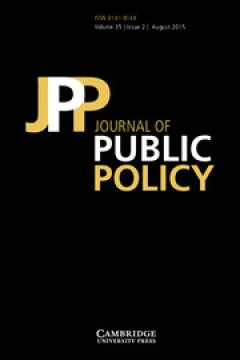
Journal of Public Policy, Volume 36, Issue 2, June 2016
- Edition
- -
- ISBN/ISSN
- 0141-814X
- Collation
- -
- Series Title
- -
- Call Number
- -
- Edition
- -
- ISBN/ISSN
- 0141-814X
- Collation
- -
- Series Title
- -
- Call Number
- -
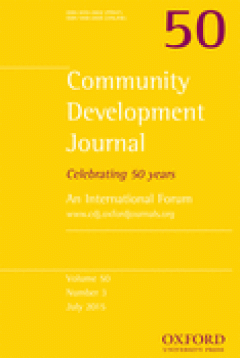
Community Development Journal, Volume 51, Number 2, April 2016
- Edition
- -
- ISBN/ISSN
- 0010-3802
- Collation
- -
- Series Title
- -
- Call Number
- -
- Edition
- -
- ISBN/ISSN
- 0010-3802
- Collation
- -
- Series Title
- -
- Call Number
- -

Politics & Gender, Volume 11, Number 4, December 2015
- Edition
- -
- ISBN/ISSN
- 1743-923X
- Collation
- -
- Series Title
- -
- Call Number
- -
- Edition
- -
- ISBN/ISSN
- 1743-923X
- Collation
- -
- Series Title
- -
- Call Number
- -
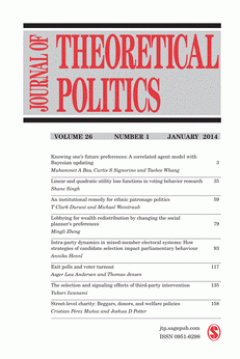
Journal of Theoretical Politics, Volume 28, Number 1, January 2016
- Edition
- -
- ISBN/ISSN
- 0951-6298
- Collation
- -
- Series Title
- -
- Call Number
- -
- Edition
- -
- ISBN/ISSN
- 0951-6298
- Collation
- -
- Series Title
- -
- Call Number
- -
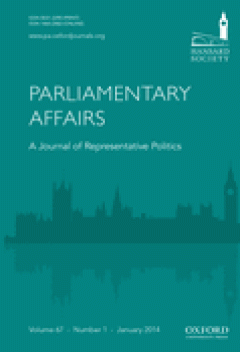
Parliamentary Affairs: a journal of representative politics, Volume 69, Numbe…
- Edition
- -
- ISBN/ISSN
- 00312290
- Collation
- -
- Series Title
- -
- Call Number
- -
- Edition
- -
- ISBN/ISSN
- 00312290
- Collation
- -
- Series Title
- -
- Call Number
- -
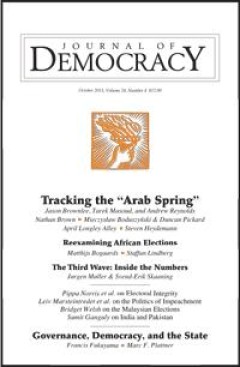
Journal of Democracy, Volume 27, Number 2, April 2016
- Edition
- -
- ISBN/ISSN
- 10455736
- Collation
- -
- Series Title
- -
- Call Number
- -
- Edition
- -
- ISBN/ISSN
- 10455736
- Collation
- -
- Series Title
- -
- Call Number
- -

Where Are the Children?: Theorizing the Missing Piece in Gendered Sexual Viol…
Feminists have been central to virtually every era of activism around child sexual abuse, from moral reformers in the 1800s and early 1900s, to the 1980s survivors� movement (Breines and Gordon 1983; Freedman 2013; Sacco 2009; Whittier 2009). Most recently, feminist analysis of child sexual abuse grew in the 1970s alongside that of rape, as participants in consciousness- raising groups disco…
- Edition
- Volume 30, Issue 1, February 2016, pp. 95–108
- ISBN/ISSN
- 08912432
- Collation
- -
- Series Title
- Gender & Society
- Call Number
- -

Over the Law: Rape and the Seduction of Popular Politics
As in many parts of the world, rape in India is rarely criminalized in practice. While Indian law houses an ever-expanding set of provisions against sexual violence (with notable exceptions for marital and same-sex rape), rape charges are frequently suppressed by the criminal justice system, processed with excruciating slowness, or can lead to out-of-court settlements. What is remarkabl…
- Edition
- Volume 30, Issue 1, February 2016, pp. 80–94
- ISBN/ISSN
- 08912432
- Collation
- -
- Series Title
- Gender & Society
- Call Number
- -

Bad Men, Good Men, Bystanders: Who Is the Rapist?
In an influential article, Carine Mondorossian (2002, 753) lamented that a �lopsided focus� on victims in public discussions of rape tended to support a belief that victims of sexual assault suffered from a �self-defeating personality disorder.� This lopsided focus also left questions related to perpetrators�and by extension, actions aimed at preventing future assaults�out of focus. Res…
- Edition
- Volume 30, Issue 1, February 2016, pp. 57–66
- ISBN/ISSN
- 08912432
- Collation
- -
- Series Title
- Gender & Society
- Call Number
- -

Theorizing Wartime Rape: Deconstructing Gender, Sexuality, and Violence
Throughout the history of warfare, rape and other forms of sexual violence against children, women, and men have been extremely widespread and prolific.1 Despite long-standing legal and political silences, rape in war has endured as a �lasting legacy� of violent conflict in artistic, documentary, and cinematic representations throughout history, albeit almost exclusively when perpetrate…
- Edition
- Volume 30, Issue 1, February 2016, pp. 44–56
- ISBN/ISSN
- 08912432
- Collation
- -
- Series Title
- Gender & Society
- Call Number
- -

The Rape Prone Culture of Academic Contexts: Fraternities and Athletics
About two decades ago, feminist sociologists stopped focusing on rape and sexual assault even though rapes and their destructive toll on girls and women did not end. Rape did not diminish appreciably and neither did the legal justice system dramatically improve its treatment of victims. Perhaps this is why 80 percent of women college students and 67 percent of non-college women fail to …
- Edition
- Volume 30, Issue 1, February 2016, pp. 30–43
- ISBN/ISSN
- 08912432
- Collation
- -
- Series Title
- Gender & Society
- Call Number
- -

Forty Years after Brownmiller: Prisons for Men, Transgender Inmates, and the …
When Susan Brownmiller published Against Our Will: Men, Women, and Rape in 1975, few anticipated that it would become a feminist classic published in more than a dozen languages. Even fewer imagined that it would foreshadow a proliferation of public discourse on sexual assault in an array of institutions, including the family, the workplace, higher education, sports, the Church, and the…
- Edition
- Volume 30, Issue 1, February 2016, pp. 14–29
- ISBN/ISSN
- 08912432
- Collation
- -
- Series Title
- Gender & Society
- Call Number
- -

An Open Letter from Black Women to the Slutwalk
The Slut Walks emerged in 2011 after a police officer�s comment to University of Toronto students which equated women�s �slutty� dress with the probability of sexual assault. His comments inspired global protests against sexual profiling, slut shaming and sexual assault. BLACK WOMEN�S BLUEPRINT Posted on Friday, September, 23, 2011 We the undersigned women of African descent and antiviolence…
- Edition
- Volume 30, Issue 1, February 2016, pp. 9–13
- ISBN/ISSN
- 08912432
- Collation
- -
- Series Title
- Gender & Society
- Call Number
- -

Women in Power: Undoing or Redoing the Gendered Organization?
A growing literature examines the organizational factors that promote women�s access to positions of organizational power. Fewer studies, however, explore the implications of women in leadership positions for the opportunities and experiences of subordinates. Do women leaders serve to undo the gendered organization? In other words, is women�s greater representation in leadership positions…
- Edition
- Volume 30, Issue 1, February 2016, pp. 109–135
- ISBN/ISSN
- -
- Collation
- -
- Series Title
- Gender & Society
- Call Number
- -

Evaluating the environment as a global public good
Global public goods are defined as non-excludable and non-rivalrous. Global environmental challenges, such as biodiversity conservation or climate change mitigation, fall squarely into this category. This contribution focuses on the specific dimensions of evaluating the provision of global public goods in light of experiences from the Global Environment Facility. As global environmental…
- Edition
- Volume 22, Issue 1, January 2016; pp. 108–115
- ISBN/ISSN
- 13563890
- Collation
- -
- Series Title
- Evaluation : The International Journal of Theory, Research and Practice
- Call Number
- -

Evaluating collaboration: The creation of an online tool employing Q methodology
The continued prevalence of different forms of collaborative working within public policy requires adaption in evaluation practices. In recent years evaluation toolkits, audits and guides have migrated online, but with varying success. At their worst, such tools can offer a disengaging user experience, limited coverage of issues or normative bias. This article outlines POETQ, designed t…
- Edition
- Volume 22, Issue 1, January 2016; pp. 91–107
- ISBN/ISSN
- 13563890
- Collation
- -
- Series Title
- Evaluation : The International Journal of Theory, Research and Practice
- Call Number
- -

Reframing how evaluators think and act: New insights from Ernest House
This essay examines some of the core concerns of House�s approach to evaluation, with specific reference to his latest book Evaluating: Values, Biases and Practical Wisdom. This is a difficult book to characterise in a few pithy statements. Part memoir, part evaluation novella and part scholarly textbook. Arguably, this is one of the most unique discourses on evaluation in the past deca…
- Edition
- Volume 22, Issue 1, January 2016; pp. 58–71
- ISBN/ISSN
- 13563890
- Collation
- -
- Series Title
- Evaluation : The International Journal of Theory, Research and Practice
- Call Number
- -

Integrating theory-based evaluation and process tracing in the evaluation of …
Over the last two decades, gender-responsive budgeting has gained prominence as an effective tool for governments to fulfil gender commitments and the realisation of women�s rights. To date, however, limited empirical evidence exists of the impact and effectiveness of gender budget initiatives. This article proposes and demonstrates the integration of theory-based evaluation and process…
- Edition
- Volume 22, Issue 1, January 2016; pp. 72–90
- ISBN/ISSN
- 13563890
- Collation
- -
- Series Title
- Evaluation : The International Journal of Theory, Research and Practice
- Call Number
- -

OPALesence: Epistemological pluralism in the evaluation of a systems-wide c…
The evaluation of complex systems-wide public health interventions requires evaluation research that is underpinned by theory. This article presents and discusses the trans-disciplinary evaluation research framework developed to support the evaluation of a South Australian program called OPAL (Obesity Prevention and Lifestyle). The aim is to provide insights into the research design, me…
- Edition
- Volume 22, Issue 1, January 2016; pp. 29–48
- ISBN/ISSN
- 13563890
- Collation
- -
- Series Title
- Evaluation : The International Journal of Theory, Research and Practice
- Call Number
- -
 Computer Science, Information & General Works
Computer Science, Information & General Works  Philosophy & Psychology
Philosophy & Psychology  Religion
Religion  Social Sciences
Social Sciences  Language
Language  Pure Science
Pure Science  Applied Sciences
Applied Sciences  Art & Recreation
Art & Recreation  Literature
Literature  History & Geography
History & Geography